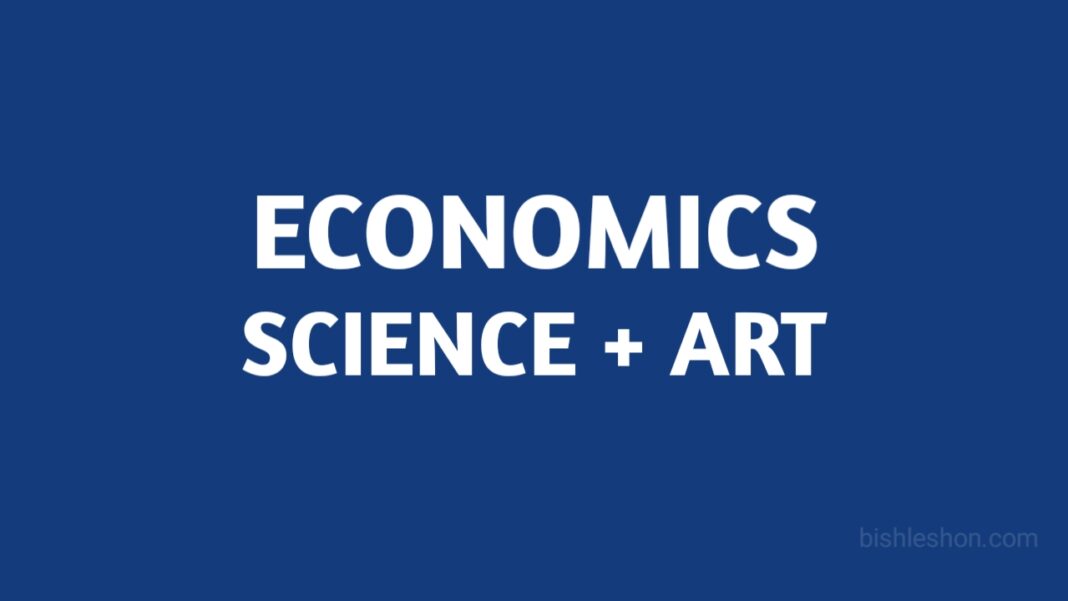Economics is a subject that has always generated a great deal of debate among scholars, students, and policymakers alike. Some people argue that economics is a science, while others contend that it is an art. In this article, we will explore this question and try to answer it based on various perspectives and arguments.
Table of contents
Defining Science and Art
To better understand the debate surrounding economics, it is crucial to define science and art. Science is a systematic and logical approach that seeks to understand the natural world through observation, experimentation, and analysis. It relies on empirical data and mathematical models to test hypotheses and establish cause-and-effect relationships. On the other hand, art is a creative and expressive form of human activity that involves subjective interpretation and aesthetic appreciation. It does not rely on empirical data or mathematical models but rather on the artist’s intuition and personal vision.
Introduction: What is Economics?
Before delving into the debate of whether economics is a science or an art, it is essential to define what economics is. Economics is a social science that studies how individuals, organizations, and societies allocate scarce resources to satisfy their unlimited wants and needs. Economics is concerned with a broad range of issues, including production, consumption, distribution, trade, and growth.
Economics as a Science: Methodology and Assumptions
Economics has often been compared to natural sciences such as physics and chemistry because it uses similar methodologies, such as empirical analysis, mathematical models, and experiments, to study economic phenomena. Economists make assumptions about human behavior, market structures, and other factors to create models that predict economic outcomes. These models are then tested against real-world data to determine their validity and reliability.
The scientific approach of economics has led to many significant discoveries and advancements, such as the theory of supply and demand, the concept of elasticity, and the law of diminishing returns. These findings have helped policymakers design better economic policies and regulations.
Economics as an Art: Subjectivity and Context
On the other hand, some argue that economics is more of an art than a science. They contend that economic phenomena are too complex and multidimensional to be captured by mathematical models or statistical analysis alone. Economics involves value judgments, subjectivity, and context, which are not easily quantifiable or measurable.
For instance, when it comes to issues such as poverty, inequality, or environmental sustainability, economists may have different views on what constitutes a fair or desirable outcome. Economic policies and decisions often involve trade-offs between different goals, such as efficiency, equity, and sustainability, which require a nuanced understanding of social and cultural factors.
The Interplay between Science and Art in Economics
While economics has both scientific and artistic elements, the debate over whether it is a science or an art is ultimately a false dichotomy. The reality is that economics is a hybrid discipline that combines empirical analysis, mathematical modeling, and subjective judgments to understand complex economic phenomena.
Economists use scientific tools to collect and analyze data, develop hypotheses, and test theories. However, they also need to take into account social and cultural factors, historical contexts, and normative considerations to make informed policy recommendations.
Moreover, economics is not a monolithic field, but rather a diverse and evolving one that encompasses different schools of thought, methodologies, and perspectives. From neoclassical economics to Marxist economics, from behavioral economics to feminist economics, there are many ways of approaching and understanding economic issues.
Economics as a Social Science
Economics is neither purely a science nor an art but rather a social science that combines both. It employs scientific methods to understand economic phenomena and make predictions about the future. At the same time, it recognizes the subjective, contextual, and normative dimensions of economic decisions and policies.
Economics is a vital discipline that influences many aspects of our daily lives, from prices and wages to employment and innovation. Therefore, it is essential to have a nuanced understanding of its strengths and limitations and to recognize that there are multiple ways to approach economic issues. By embracing both the scientific and artistic dimensions of economics, we can gain a more comprehensive understanding of how the economy works and how we can make it work better for everyone.
Bibliography
- Blaug, M. (1997). Economic theory in retrospect (5th ed.). Cambridge: Cambridge University Press.
- Colander, D. (2017). Microeconomics (10th ed.). New York: McGraw-Hill Education.
- Friedman, M. (1953). The methodology of positive economics. In Essays in Positive Economics (pp. 3-43). University of Chicago Press.
- Hausman, D. M. (1992). The inexact and separate science of economics. Cambridge University Press.
- Hodgson, G. M. (2001). How economics forgot history: The problem of historical specificity in social science. London: Routledge.
- Mankiw, N. G. (2016). Principles of economics (8th ed.). Boston: Cengage Learning.
- McCloskey, D. N. (1983). The rhetoric of economics. Journal of Economic Literature, 21(2), 481-517.
- Samuelson, P. A. (1947). Foundations of economic analysis. Harvard University Press.
- Sen, A. K. (1993). Capability and well-being. In M. C. Nussbaum & A. K. Sen (Eds.), The quality of life (pp. 30-53). Oxford: Clarendon Press.
- Smith, A. (1776). An inquiry into the nature and causes of the wealth of nations. W. Strahan and T. Cadell.
- Stigler, G. J. (1965). The logic of scientific discovery. Journal of Political Economy, 73(1), 1-14.



 For all latest articles, follow on Google News
For all latest articles, follow on Google News